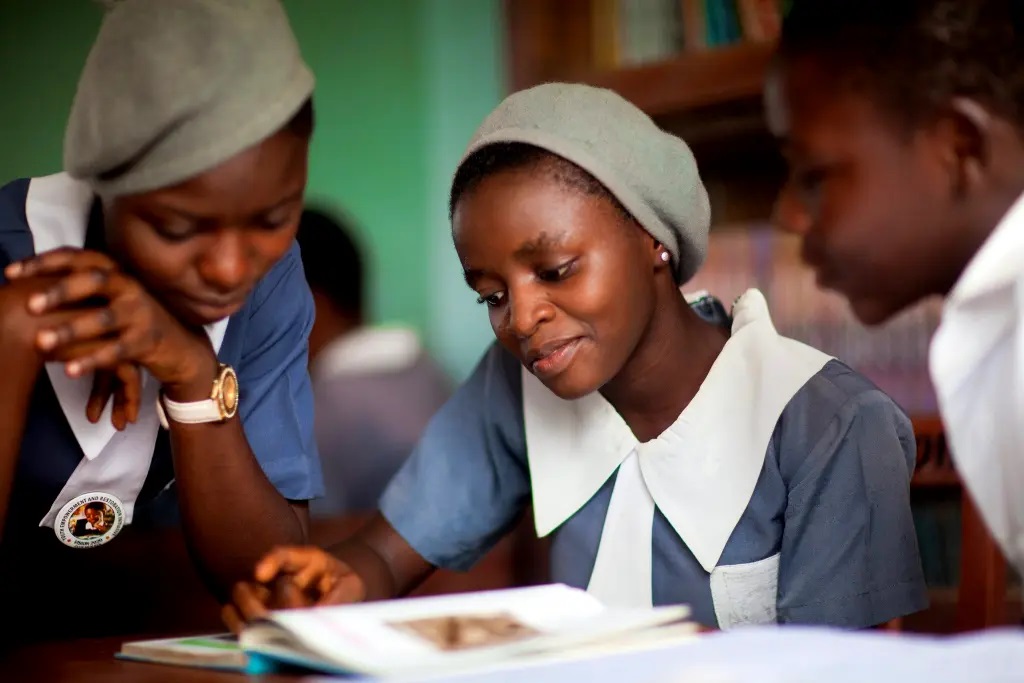Broadcasting
Girl Child Education In Nigeria, Five Important Facts You Should Know

At various points, creatives in the entertainment industry spotlighted impending issues in Nigerian society, especially the need for women’s empowerment. From Simi’s woman anthem, ‘Woman’, to ‘Koroba’ by Tiwa Savage, these women are at the forefront of highlighting the need for girl child empowerment.

The Girl child in Nigeria accounts for over 23 million of the population of children given birth yearly. Yet, little or nothing is done to protect the interest of this large population of children.
There is the battle for equality, education, and poverty at the top of the list. Here are five essential facts about girl child education in Nigeria.
1. 10 Million Girl Children Are Out Of School
In every public school in Nigeria, education is supposed to be free and compulsory. However, there are still over 18 million out-of-school children, with girls accounting for 10 million. More needs to be done, from religious leaders not taking female education seriously to key government parastatals overlooking the importance of empowering the girl child.
2. 22 Million Girls Were Married Off At Childhood
In 2018, UNICEF estimated that about 22 million girls and women in Nigeria were married off in childhood. According to these statistics, about 40% of all child brides come from West and Central Africa. By 2050 nearly seven million more child brides will be added. These women who are married off are unlikely to go back to school.
3. Less Than 30% Of Primary School Girls Transit To JSS
The Universal Basic Education Commission (UBEC) disclosed that less than 30% of the total number of primary six female pupils in Nigeria transit to junior secondary schools nationwide yearly, a statistic that Nigerians should be worried about.
4. Girl Education Drives Positive Development Outcomes
According to a report by the World Bank, girl child education, especially at the secondary level, drives positive development outcomes, which include reduction in child and maternal mortality rates, improvements in educational outcomes of offspring, reducing poverty and promotion of equitable growth.
5. 11,500 Schools Have Been Closed Due To Insecurity
Over 11,500 schools have been closed since December 2020 due to insecurity in Nigeria, with the girl childbearing the brute. According to UNICEF, this closure has affected over 1.3 million children in the 2020/21 academic year.
Despite these statistics, the government in 2021 allocated N742.5 billion to the entire education system out of the N13.08 trillion budgeted for 2021.
This is why it’s important to speak up about education in Nigeria, especially the girl child education, and Chiemeka Osuagwu is doing this with the short film ‘Samaria’, which premiered on October 11, 2021.
Broadcasting
Big Brother Naija Season 10 to Premiere July 26 with Record ₦150m Grand Prize

MultiChoice Nigeria, today announced the highly anticipated return of Africa’s biggest reality television show, Big Brother Naija, for its landmark 10th season. Set to premiere over two nights on Saturday, July 26 and Sunday, July 27, 2025, the new season promises 10 weeks of captivating drama, strategic gameplay, and unparalleled entertainment, culminating in the grand finale on Sunday, October 5, 2025.

The audition process for this milestone season was meticulously designed to unearth the most engaging and dynamic personalities from across Nigeria. Audition registrations were held from May 3rd to May 7th, 2025, and saw an overwhelming response, followed by rigorous in-person auditions conducted in Lagos, Abuja, and Enugu from May 16th to May 18th, 2025.
Speaking on the upcoming season, Busola Tejumola, Executive Head, General Entertainment, MultiChoice Group, expressed her excitement: “Today we are not just announcing another season, we are celebrating a legacy.”
While the official theme for Season 10 will be unveiled on the premiere night, viewers can anticipate a fresh wave of excitement. The beloved Ebuka Obi-Uchendu is returning as host, guiding viewers through every twist and turn of the season. This 10th season also has the highest prize at stake – valued at a whopping N150million.
Fans can catch the premier live on July 26 and 27 exclusively on Africa Magic Showcase, Family and Showmax at 7 PM WAT. The Sunday live eviction shows will also air exclusively on these channels. The 24/7 live stream will be available on DStv Channel 198, GOtv Channel 49, and on Showmax.
“BBNaija has become more than just a television show; it is a living, breathing cultural force. It has given voice to a new generation of talent, creatives, entertainers, and the influencer community, and it has refined what homegrown entertainment can achieve when it is done at scale with intention and ambition,” added Tejumola.
With a two-night opening live show for Big Brother Naija Season 10, the season is poised to build upon the legacy of its predecessors, with fans expecting a more dynamic and entertaining experience. Still speaking on what the season holds Dr. Tejumola said “Today we are not just announcing another season, we are celebrating a legacy. From the very first time we introduced Big Brother Naija in 2017, we had an inkling that we had something special. What we couldn’t fully imagine then is how deeply the show would resonate not only in Nigeria but across Africa and in the global diaspora, where our stories continue to connect people to home.”
This milestone season for the iconic show is not without the usual lineup of sponsors. The gold sponsor for the 10th season of the show is Guinness Nigeria. Other sponsors include Smirnoff, Gordons, HFM, Pepsi, Aquafina, Supakomando, Tolaram Group, Bet King, Golden Penny Foods, Haier Thermocool, Checkers custard, and Innoson Motors, among others.
Viewers can catch all the live action and special broadcasts on DStv Channel 198, GOtv Channel 49, and Showmax. The live Sunday eviction shows will air exclusively on Africa Magic Showcase (DStv Channel 151, GOtv Channel 8), Africa Magic Family (DStv Channel 154, GOtv Channel 7) and on Showmax.
DStv and GOtv subscribers can also watch the show on the go using the DStv and GOtv Stream apps available on the Google Play Store and IOS App Store.
Broadcasting
GEFAS to Launch Innovation Hub in Anambra, Backs Soludo’s Digital Vision

Geeks and Founders Alliance for Soludo (GEFAS), a tech-driven network of young professionals, is set to unveil its operational hub in Anambra State as part of efforts to deepen digital engagement and community outreach.

The launch, scheduled for July 17, 2025, will take place at 10 Uche Ekwunife Crescent, Iyiagu Estate, Awka, and is expected to serve as a nerve centre for collaboration, innovation and support for Governor Chukwuma Soludo’s smart city agenda.
Convener of GEFAS, Mr Fred Agbata, said the initiative reflects the group’s commitment to digital progress and grassroots mobilisation.
“This space reinforces our support for Governor Soludo’s vision of a smart, prosperous Anambra. It’s also a demonstration of what young innovators can achieve when united behind a bigger goal—the re-election of Governor Soludo,” he said.
Agbata added that the hub would provide a platform for tech enthusiasts, entrepreneurs and creatives to co-create solutions that address local challenges and promote inclusive development.
GEFAS has called on stakeholders, youth groups and members of the public to attend the launch and engage with the opportunities the space will offer.
Broadcasting
Over 5,600 Pupils to Benefit as ATC, ProFuturo Partner on Tech-Driven Learning

American Tower Corporation (ATC) Nigeria and the ProFuturo Foundation have announced a strategic partnership aimed at transforming the educational sector through digital innovation and technology.

The programme, which is being implemented in conjunction with the Kukah Centre, is expected to benefit over 5,600 school children and 34 teachers across 11 schools in Kano, Kebbi and Taraba states.
The initiative is part of a broader global collaboration between American Tower and ProFuturo Foundation, targeting education gaps in seven African and Latin American countries.
Speaking at the signing ceremony, ATC Nigeria Chief Executive Officer, Mr Pieter Van Der Westhuizen, said the partnership was aligned with the company’s Digital Communities programme, which facilitates technology-driven learning, financial literacy for adults and access to healthcare services in underserved areas.
“At ATC Nigeria, we are proud to support this impactful collaboration, which brings digital tools directly into classrooms. This partnership is not just about equipment—it’s about giving children the future they deserve,” he said.
General Manager of ProFuturo Foundation, Ms Magdalena Brier, described the partnership as a crucial step towards bridging the digital divide and empowering vulnerable communities.
“This alliance reinforces our mission to transform lives by improving access to education and digital tools. Every child and teacher reached through this programme is a testament to what we can achieve together,” she said.
Each school will be equipped with a digital learning kit, which includes computers, tablets, routers, projectors and other essential components tailored to foster interactive learning—even in areas with limited connectivity.
The initiative seeks to strengthen innovative teaching practices and promote inclusive education through digital transformation, with active support from local authorities who were present at the official launch.

 Telecom3 days ago
Telecom3 days agoMTN’s ₦31.75Bn Investment in Health Lauded at Arthur Mbanefo Lecture

 News3 days ago
News3 days agoCAC Flags Three Companies, Warns Nigerians

 Broadcasting3 days ago
Broadcasting3 days agoBig Brother Naija Season 10 to Premiere July 26 with Record ₦150m Grand Prize

 E-Business3 days ago
E-Business3 days agoFrance Moves to Tackle Online GBV in Africa with $4.3m Funding

 E-Business3 days ago
E-Business3 days agoNDPC Asks Court to Dismiss Meta’s Suit Challenging $32.8m Fine

 General News3 days ago
General News3 days agoFG to Launch Fully Digital Expatriate Residence Permit Application Portal August 1

 Telecom3 days ago
Telecom3 days agoPIN to Empower 20 Million Youths with New Digital Rights Board Game

 News3 days ago
News3 days agoAfDB to Introduce Systems Reforms to Prioritize Investing in Africa’s Youth



























